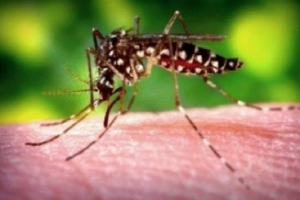No New Dengue Cases Reported, Count at 259

An Aedes aegypti mosquito is pictured here. The mosquito is one of two in Hawai’i known to spread the dengue virus. Hawai’i Department of Health photo.
No new dengue fever cases have been reported since Friday.
Hawai’i Department of Health officials maintain that the list of confirmed dengue cases stands at 259, including one listed as “potentially infectious.” The case has an onset of illness of Feb. 13.
Since the outbreak’s onset in October, 234 Big Island residents have been infected with the dengue virus, along with 25 island visitors. The total number also includes 46 individuals listed as children, or those under the age of 18.
Twenty-five cases have been excluded from the confirmed count since Friday, with a total of 1,287 cases in total excluded since the beginning of the outbreak. Potential cases excluded from the count have had test results come back negative and/or lacked case criteria.
Waipio Valley Access Road remains closed and limited to valley residents only due to the ongoing outbreak. Milolii and Hookena have also remained closed.
DOH, Hawai’i County Civil Defense, Community Response Teams, and community partners began door-to-door dengue education outreach in Kailua-Kona last week.
County officials said the outreach is a proactive and preventative effort to inform residents, visitors, and businesses about ways to reduce exposure to dengue and to promote the “Fight the Bite” campaign.
Community meetings are being held through the month of February on a weekly basis in both East and West Hawai’i.
Hilo sessions take place on Thursdays at 11:30 a.m. at the State Office Building, located on Aupuni Street. Kona sessions are held at the same time, but at the West Hawai’i Civic Center Mayor’s Conference Room.
Tuesday sessions are being held at Yano Hall in Captain Cook, beginning at 12:30 p.m.
The community meetings provide updates and answers to questions from the community about the dengue fever outbreak on the Big Island, as well as education about the prevalence, transmission, and symptoms of dengue fever, along with outbreak response efforts, how to interpret case counts and maps, and the best ways to “Fight the Bite.”
Symptoms of dengue fever include fever, joint or muscle pain, headache or pain behind the eyes, and rash.
Those interested in obtaining general information about the current Big Island dengue fever investigation should call 2-1-1 and talk with Aloha United Way.
Anyone who thinks they may have contracted dengue fever on the Big Island should call 933-0912 if they are located in East Hawai‘i or 322-4877 in West Hawai‘i. If an individual is currently ill and concerned that they may have contracted dengue fever, they should contact their primary care physician.
Civil Defense suggests the following to aid in reducing potential mosquito breeding areas around homes and businesses:
- Remove or eliminate standing water that provides sources for mosquito breeding such as buckets or puddles.
- Fix leaky faucets and outdoor hoses that are dripping water.
- Treat bromeliads and other plants that hold water with a larvacide or chlorine bleach solution.
- Clean gutters to allow water to drain freely.
- Repair screens and windows to help keep mosquitoes out.
- Dispose of old tires at no charge at county transfer stations islandwide.
Mosquito concerns should be reported to 974-6010 in East Hawai‘i or 322-1513 in West Hawai‘i.















